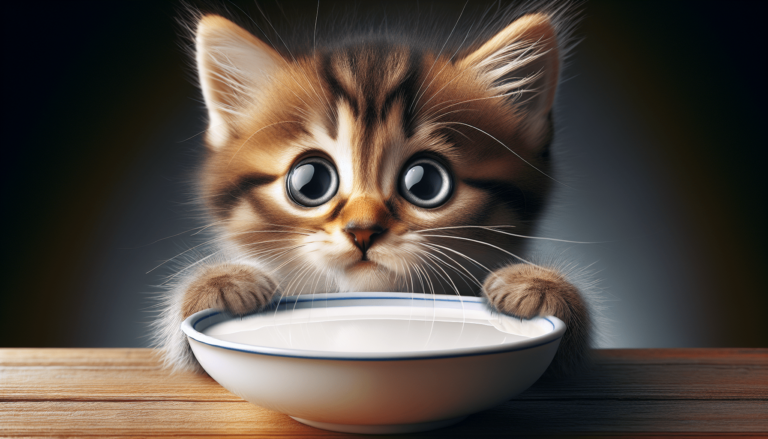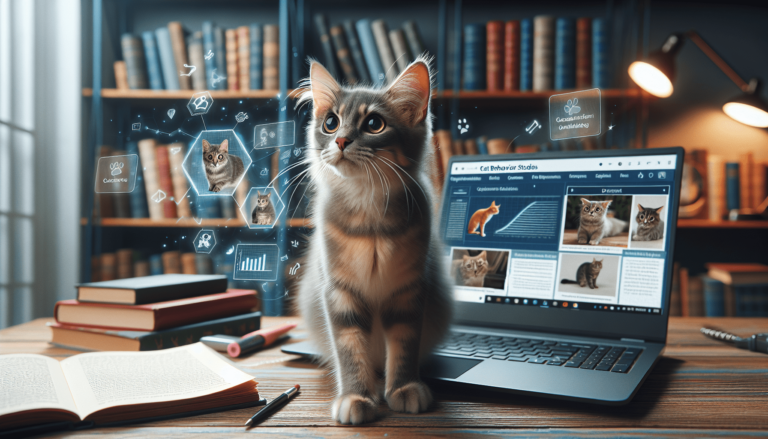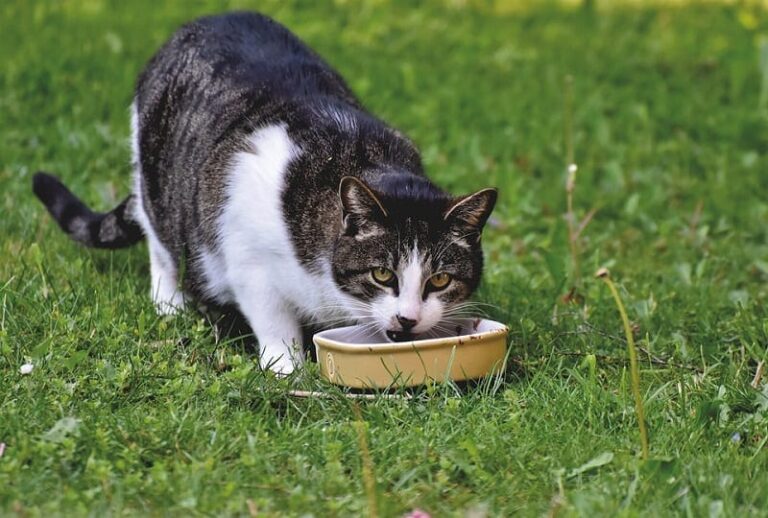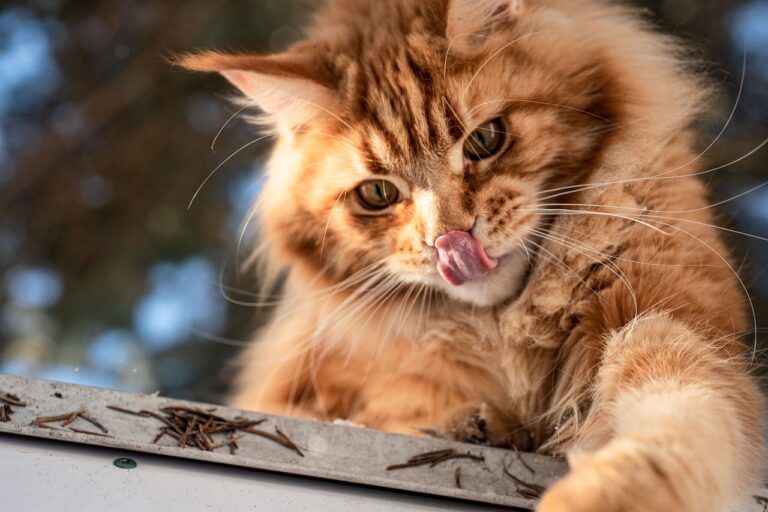Can Cats Eat Carrots
Are you a cat lover wondering if it’s safe for your furry friend to snack on carrots? You’re not alone! In this article, we’ll explore the question of whether cats can eat carrots. We’ll discuss the potential benefits and drawbacks, and provide some guidelines to ensure your cat’s safety and well-being when it comes to this crunchy orange vegetable. So, let’s find out if your feline companion can have a carrot-tastic treat or if it’s better to stick to their regular cat food.
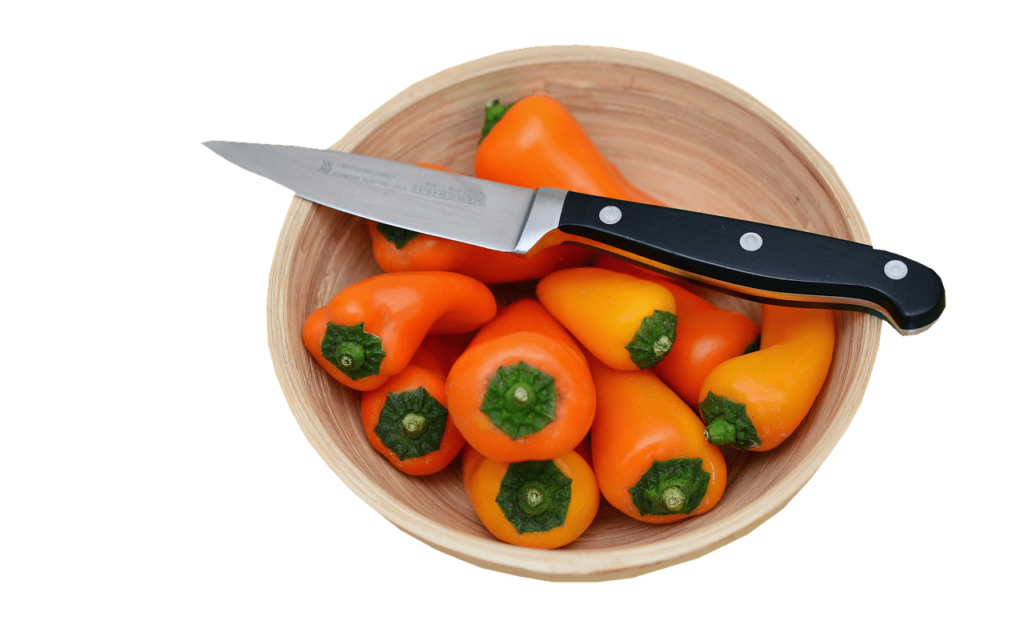
Understanding cat’s dietary needs
Cats are obligate carnivores, meaning their bodies are designed to thrive on a diet consisting mainly of meat. Unlike humans, cats have specific nutritional requirements that can only be fully met through a carnivorous diet. Understanding these dietary needs is vital in ensuring the long-term health and well-being of our feline friends.
Importance of a carnivorous diet for cats
A carnivorous diet is essential for cats because it provides them with the necessary nutrients to support their overall health. Cats require high levels of protein, as well as specific amino acids like taurine, which can only be obtained from animal sources. Additionally, cats need certain vitamins, minerals, and fatty acids that are naturally present in meat. A well-balanced carnivorous diet helps maintain a cat’s healthy weight, promotes muscle development, supports their immune system, and ensures the proper function of their organs.
Differences between human and feline metabolism
One major difference between human and feline metabolism lies in their ability to digest and utilize nutrients. Cats have a shorter digestive tract than humans, which is adapted for digesting and absorbing nutrients from meat. They have a higher requirement for dietary protein and cannot efficiently break down plant-based foods. Unlike humans, cats lack specific enzymes needed to digest carbohydrates effectively. Therefore, a cat’s metabolism thrives on a diet that is predominantly meat-based, reflecting their natural dietary habits as predators.
Can Cats Eat Carrots – Quick Overview
Now that we understand the importance of a carnivorous diet for cats, let’s explore whether cats can eat carrots and the potential benefits they may provide.
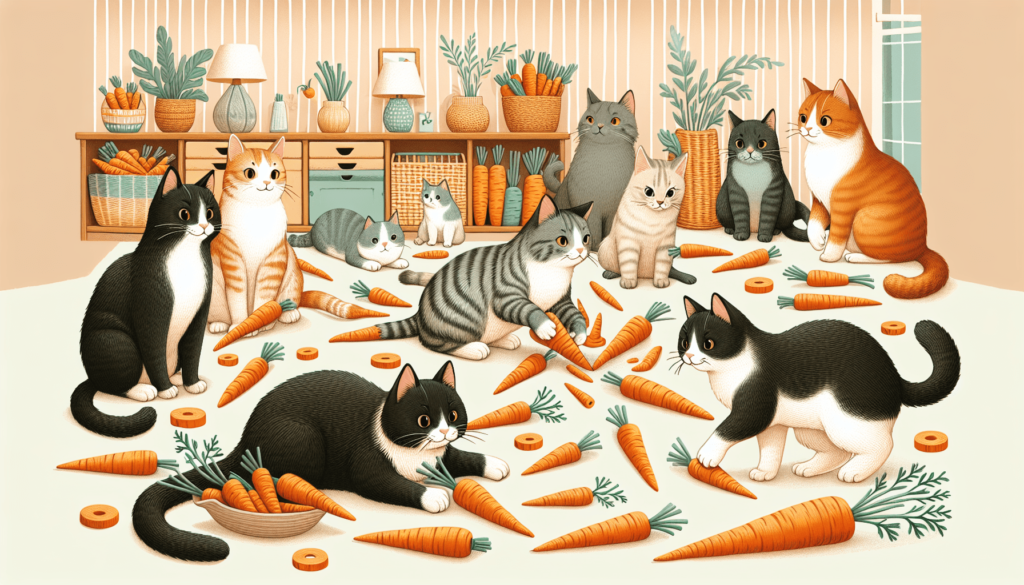
Cats’ ability to eat carrots
Yes, cats can eat carrots. However, it is important to remember that carrots should only be given to cats in moderation and as part of a well-balanced diet. While cats are obligate carnivores, they may occasionally show interest in nibbling on vegetables like carrots. Carrots can be a safe and enjoyable treat for cats, but they should not be a substitute for their primary diet.
Potential benefits for cats
Carrots offer several potential benefits for cats. They are packed with essential vitamins and minerals such as vitamin A, vitamin K, potassium, and fiber. These nutrients are important for various bodily functions, including immune system support, healthy vision, and proper digestion. Carrots also contain antioxidants, which help protect the cells from damage caused by harmful free radicals. While these benefits can be advantageous for cats, it should be noted that they can be obtained through their regular diet as well.
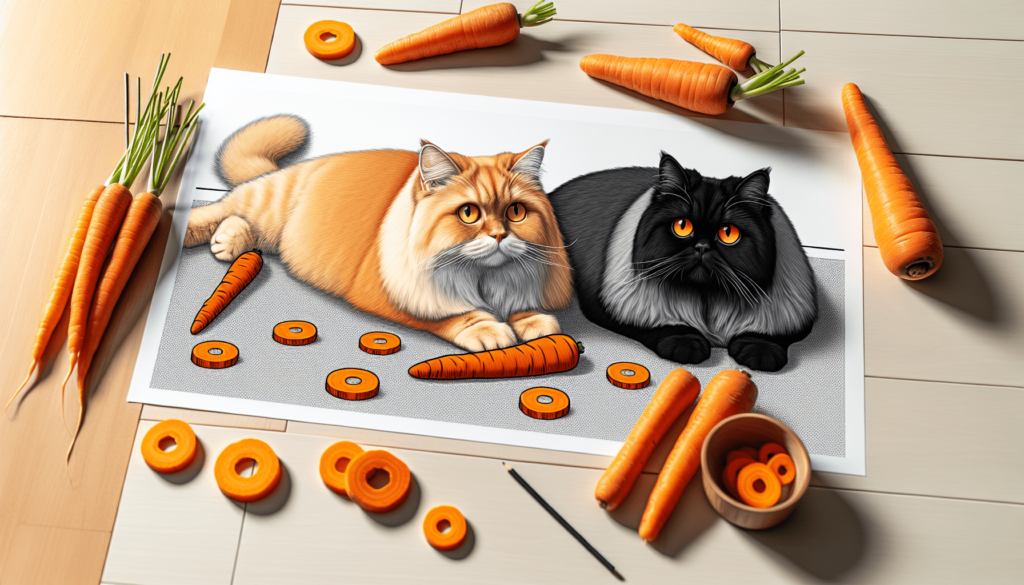
Benefits of Carrots
Carrots provide numerous benefits for both humans and cats due to their rich nutrient profile.
Presence of vitamins and minerals
Carrots are a fantastic source of essential vitamins and minerals. They contain high levels of vitamin A, which is crucial for maintaining healthy vision, supporting the immune system, and promoting skin and coat health in cats. Additionally, vitamin K found in carrots aids in blood clotting, bone health, and heart function. The potassium content helps regulate hydration and supports proper muscle and nerve function.
Positive effects on human and cat vision
Carrots have long been associated with promoting good vision, and this holds true for cats as well. The high levels of beta-carotene present in carrots are converted by the body into vitamin A, which is necessary for optimal eye health and vision. Regular consumption of carrots may help reduce the risk of certain eye conditions and promote overall eye health.
Antioxidant properties
Carrots are rich in antioxidants, compounds that help protect cells from damage caused by free radicals. The antioxidants found in carrots, such as beta-carotene and lutein, have been linked to a decreased risk of chronic diseases, including certain types of cancer. Incorporating carrots into a cat’s diet in moderation can contribute to their overall well-being and provide additional antioxidant support.
Is it safe for cats to eat carrots?
While cats can enjoy the occasional carrot treat, it is essential to prioritize their specific dietary needs and consider potential drawbacks.
Checking for potential allergies
As with any new food introduction, it is crucial to observe your cat for any signs of allergies or adverse reactions. Some cats may have an allergic reaction to carrots, resulting in symptoms such as gastrointestinal distress, itching, or difficulty breathing. If you notice any unusual behaviors or symptoms after feeding your cat carrots, it is best to discontinue giving them this particular treat and consult with a veterinarian.
Possible negative impacts on digestion
Cats have a sensitive digestive system, and introducing new foods into their diet can sometimes cause digestive upset. Carrots contain fiber, which is generally beneficial for digestion. However, too much fiber can lead to gastrointestinal issues such as diarrhea or constipation in cats. It is important to start with small quantities of carrots and monitor your cat’s response, adjusting the portion size accordingly.
Understanding quantities suitable for cats
When it comes to feeding carrots to cats, moderation is key. Carrots should only be given as an occasional treat and not as a staple food. A small portion, such as a teaspoon or less, is usually sufficient. It is essential to balance your cat’s diet with appropriate amounts of high-quality protein from animal sources to fulfill their nutritional requirements.
Preparation of Carrots for Cats
Before serving carrots to your cat, it is important to prepare them properly to ensure maximum safety and palatability.
Cooking methods for carrots
Raw carrots are generally safe for cats to eat, but some cats may find them more challenging to chew and digest. Steaming or boiling carrots until they are soft and tender can make them easier for cats to consume, especially for those with dental issues or older cats with reduced jaw strength. Avoid using any seasonings, oils, or additives when cooking carrots for your cat.
Importance of thorough cleaning
Whether feeding raw or cooked carrots, it is crucial to wash them thoroughly to remove any dirt, pesticides, or other contaminants. Organic carrots are a good option, as they tend to be grown without the use of pesticides. Peel the carrots and wash them under running water before serving.
Cutting into small, manageable pieces
For the safety of your cat, it is best to cut the carrots into small, manageable pieces. The size of the carrot pieces should be appropriate for your cat’s size, and they should be able to chew and swallow them easily. Large pieces of carrot may pose a choking hazard, so always err on the side of caution and keep the portions small.
Serving Carrots to Cats
When introducing carrots to your cat’s diet, it is important to start slowly and make careful observations.
Starting with small pieces and observations
Begin by offering a small piece of cooked or raw carrot to your cat. Observe their reaction and, if they show interest, allow them to taste it. If your cat enjoys the carrot, you can gradually increase the portion size. However, if your cat shows disinterest or refuses to eat the carrot, respect their preferences and do not force them to consume it.
Integrating carrots as part of regular meals
If your cat enjoys carrots, you can incorporate them into their regular meals occasionally. Mix a small amount of finely chopped or grated carrot with their usual wet or dry food. This can add some variety to their diet and provide additional nutrients. Remember to always consult with your veterinarian to ensure that the addition of carrots does not disrupt the balance of your cat’s overall diet.
Cats’ Reaction to Carrots
Just like humans, cats can have varying tastes and preferences when it comes to food, including carrots. While some cats may find the taste and texture of carrots appealing, others may show disinterest or even dislike them.
Factors influencing cats’ reception of carrots
The reception of carrots by cats can be influenced by several factors. Kittens that were exposed to a variety of foods during their early development may be more accepting of new flavors like carrots. Additionally, individual cats may have preferences shaped by their previous experiences and their unique taste preferences. It is important to respect your cat’s individual preferences and not force them to eat carrots if they show aversion or disinterest.
Typical behaviors and signs of liking or disliking
When offering carrots to your cat, observe their behavior and body language to gauge their preference. Cats that enjoy carrots may show excitement, sniff the food curiously, and readily consume the offered treat. On the other hand, cats that dislike carrots may show disinterest, avoid the food, or display signs of displeasure such as turning their head away, pawing at the food, or walking away. Always take your cat’s cues into account and adjust accordingly.
Alternatives to Carrots for Cats
While carrots can be a safe and wholesome treat for cats, it is important to offer them a variety of foods to ensure they receive a well-rounded diet.
Other vegetables that cats can eat
Apart from carrots, there are other vegetables that cats can safely eat in moderation. Some examples include cooked green beans, peas, pumpkin, and spinach. These vegetables can provide additional nutrients and dietary fiber. However, it is crucial to research each vegetable thoroughly to ensure it is safe for cats and to introduce them gradually into their diet.
Understanding why variety in diet is important for cats
Offering a variety of foods to cats is important to ensure they receive a wide range of essential nutrients. Each vegetable or meat source contains different vitamins, minerals, and compounds that contribute to optimal health. A varied diet can also help prevent nutritional deficiencies and encourage a healthy appetite. Just like humans, cats appreciate diversity in their meals, so introducing different foods and flavors can make mealtime more enjoyable for them.
Frequently Asked Questions about Cats and Carrots
Here are answers to some common questions regarding cats and their ability to eat carrots.
Can cats eat cooked carrots?
Yes, cats can eat cooked carrots. Just be sure to cook them until they are soft and tender, making them easier for your cat to chew and digest.
Can carrots be harmful to cats?
Carrots are generally safe for cats when fed in moderation. However, excessive consumption can lead to digestive issues due to the high fiber content. It is important to offer carrots as an occasional treat and not as a staple of their diet.
Are cats allergic to carrots?
While cats can develop allergies to some foods, including carrots, it is relatively rare. However, it is essential to observe your cat for any signs of allergic reactions, such as vomiting, diarrhea, itching, or swelling, when introducing new foods into their diet.
Consulting with a Vet
When it comes to making dietary changes for your cat, it is always a good idea to consult with a veterinarian.
When to consult with a vet
If you are unsure about incorporating carrots or any other new food into your cat’s diet, it is best to consult with a veterinarian. They can provide expert advice based on your cat’s age, health condition, and specific dietary needs. A veterinarian can also help identify any potential risks or allergies associated with certain foods.
How to discuss diet changes with a vet
When discussing diet changes with a veterinarian, it is important to provide them with detailed information about your cat’s current diet and any specific concerns you may have. Be prepared to discuss any previous reactions or allergies your cat may have experienced. Listen to their recommendations and ask any questions you may have to ensure that you fully understand the dietary changes you are considering. Working together with your veterinarian will help ensure that your cat’s nutritional needs are met and that any dietary modifications are done safely and effectively.
In conclusion, while cats are obligate carnivores, they can safely consume carrots in moderation as part of a balanced diet. Carrots offer potential benefits such as essential vitamins and minerals, positive effects on vision, and antioxidant properties. However, it is important to be aware of potential allergies and digestive issues, and to introduce carrots gradually. Ultimately, consulting with a veterinarian is always recommended when making any changes to your cat’s diet. By understanding and meeting their dietary needs, we can help ensure that our feline companions lead happy and healthy lives.



